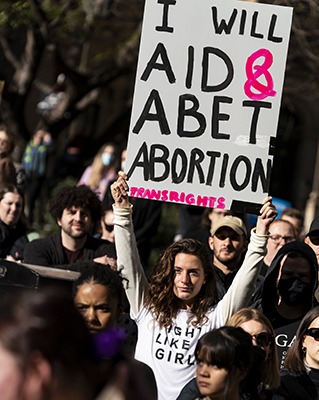Women are fully capable of making decisions about their own bodies without a committee of politicians, judges, or armchair moralists weighing in.
The core issue is autonomy. Your body, your choice. It’s not complicated unless you’re trying to make it complicated, which, as it turns out, is a thriving industry. The anti-abortion movement has built an empire on the premise that personal freedom is negotiable when it comes to reproductive health—usually negotiated by people who will never need an abortion themselves. These debates often get framed around morality. But morality is subjective. Rights are not. The legal right to abortion isn’t about whether someone approves of abortion; it’s about whether the government gets to override personal medical decisions. They should not.
Abortion has existed for as long as pregnancy has, practiced in every culture, era, and society. The difference is that in some places, it’s safe and legal, and in others, it’s dangerous and criminalized. The common denominator isn’t the prevalence of abortion—it’s the prevalence of harm. Restrictive laws don’t stop abortions; they just stop safe ones. The World Health Organization confirms this: abortion rates are roughly the same in countries where it’s legal as in those where it’s not. The difference is body count.
Criminalizing abortion isn’t just ineffective; it’s cruel. It forces people to carry pregnancies against their will, risking their health, lives, and futures. It disproportionately affects marginalized communities—those with less access to healthcare, legal resources, and safe alternatives.
Then there’s the hypocrisy. Many anti-abortion advocates champion “small government” until it comes to uteruses, at which point they’re suddenly fine with the government not just being big but practically taking up residence in your doctor’s office. They talk about “protecting life” while gutting social programs that support actual living, breathing children. Apparently, life is sacred until it requires healthcare, education, or food.
Abortion is healthcare. It’s not a political prop or a theoretical debate topic. It’s a medical procedure, one that people seek for countless personal reasons—health risks, financial circumstances, timing, personal readiness, or simply not wanting to be pregnant. And guess what? “Not wanting to be pregnant” is a perfectly valid reason, all on its own.
The right to abortion is intertwined with broader issues of gender equality. Denying reproductive autonomy keeps people—especially women—trapped in cycles of poverty, dependence, and limited opportunity. The Guttmacher Institute reports that access to abortion improves economic stability, educational attainment, and overall well-being. In other words, it’s not just a personal issue; it’s a societal one.
Countries that treat abortion as healthcare, like the Netherlands and Canada, have lower abortion rates, not because of restrictive laws but because of comprehensive sex education, accessible contraception, and robust social support systems. When you trust people with information and resources, they tend to make informed choices.
Contrast that with countries where abortion is heavily restricted, and you find higher maternal mortality rates, unsafe abortion practices, and—surprise—no decrease in abortion rates. Because here’s the uncomfortable truth for anti-choice activists: people will always seek control over their own bodies, even if it means risking their lives to do so.
Abortion stigma is another weapon used to undermine rights. It’s framed as something shameful, secretive, or selfish. But here’s a radical thought: abortion can be a responsible, thoughtful, even empowering choice. It can be a relief. It can be sad. It can be both, or neither. Because it’s personal, and personal experiences don’t need public approval.
Legally, Roe v. Wade was never enough. It established a legal precedent in the U.S., but it left loopholes wide enough to drive a morality truck through. Restrictions chipped away at access—waiting periods, mandatory counseling, parental consent laws, and “heartbeat bills” designed to ban abortion before most people even know they’re pregnant. In 2022, the U.S. Supreme Court overturned Roe v. Wade, effectively ending the federal constitutional right to abortion, leading to a patchwork of laws nationwide. Several states enacted strict abortion bans, while others reinforced protections for reproductive rights.
And even when abortion is technically legal, access can be functionally impossible. Clinics are shuttered by restrictive laws, providers face harassment, and people have to travel hundreds of miles, navigate legal hurdles, and endure invasive questioning just to exercise their rights. It’s legal in name but inaccessible in reality—a right you can’t actually reach.
Making abortion accessible as a fundamental right means protecting providers, funding clinics, and ensuring that no one has to justify their reproductive choices to anyone but themselves. It also means recognizing reproductive justice as broader than abortion. It’s about the right to have children, the right not to have children, and the right to raise families in safe, supportive environments. It’s about affordable healthcare, parental leave, childcare, and freedom from coercive policies—whether they force pregnancy or sterilization.
And yes, men have a role here, too—not as decision-makers over someone else’s body, but as allies who support autonomy, challenge stigma, and advocate for equality. Reproductive rights aren’t a “women’s issue”; they’re a human rights issue. Abortion rights aren’t up for debate because rights aren’t contingent on public opinion. They exist because people exist. They’re not fragile ideals to be legislated into oblivion with every political swing. They are fundamental, non-negotiable, and essential to freedom.
Therefore, under Folklaw:
Abortion rights shall be protected as a fundamental aspect of personal autonomy, bodily integrity, and healthcare. Access to safe, legal, and stigma-free abortion services will be guaranteed without restrictions, barriers, or delays.
Governments will ensure affordable, accessible reproductive healthcare, including contraception, comprehensive sex education, and support for all pregnancy outcomes. No person shall be criminalized for seeking, providing, or assisting with abortion care.
Legal frameworks will protect the privacy and dignity of individuals making reproductive decisions, with robust protections against harassment, discrimination, and coercion. Reproductive rights shall be recognized as essential to gender equality, public health, and human dignity.






Discussions
There are no discussions yet.